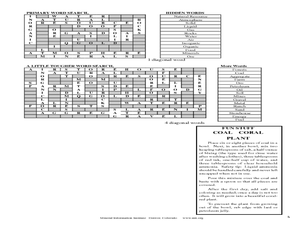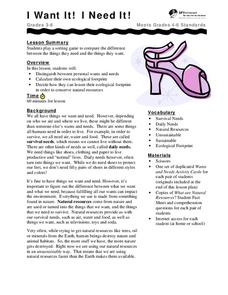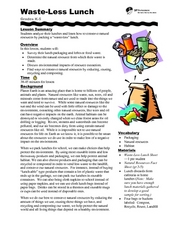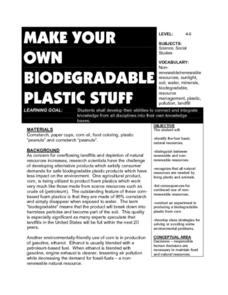Brooklyn Children’s Museum
Volcanoes!
Give young geologists an up close and personal look at volcanoes with a series of hands-on earth science lessons. Whether they are investigating the properties of igneous rocks, building their own volcanoes, or making fudge to model the...
Curated OER
Primary Activity: Dichotomous Key of Energy Sources
In this energy sources worksheet, students fill in a chart using a dichotomous key of energy sources. They use follow the directions and label items such as the sun, a windmill, and an oil rig with the proper number and letter labels...
Curated OER
Soil Analysis
Students examine zip lock bags of clay, silt, and sand to determine its origin. They rotate through stations to compare different soils and perform oil separation and Tullgren funnel tests.
American Chemical Society
Why Does Water Dissolve Sugar?
Did you know that if you wait long enough, the M on the outside of an M and M will float to the surface when submerged in water? Learners observe the sugar coating of an M and M while it is dissolving in water. They explain how this...
Curated OER
Earth: Our Big Blue Marble
Students investigate Earth and its resources. In this Earth, space, and nature lesson plan, students collaborate to design presentations on the Earth, its cycles, and how humans have impacted the planet. Images, diagrams, and background...
Colorado State University
Why Do Raindrops Sometimes Land Gently and Sometimes with a Splat?
A mouse can fall from large heights without injury! Air resistance is a large influence on small falling objects. In an exploratory lesson, young scholars build a raindrop bottle to compare the falling rate of different-sized objects.
Discovery of Sound in the Sea
How to Build a Hydrophone
The materials and procedures for building a hydrophone, an underwater sound collecting device, are provided in this resource. Have high school oceanographers construct the underwater microphone to pick up sound waves. Then take them out...
Curated OER
Density In A Wave Machine
Students explore density. In this science lesson plan, students gain an understanding of the concept of density, especially as it relates to liquid. Students demonstrate that a less dense liquid will float on a denser liquid and that...
Curated OER
Density - An Introduction
Learners experiment with objects of different densities. In this density lesson, students examine same-sized objects with different weights, then look at a teacher explanation of density. Learners make wave bottles and a density jar to...
Curated OER
The Shape of Things
Sixth graders read and discuss information regarding the shape and attributes of an eggshell. For this shape of things lesson, 6th graders gather relevant information that pertains to the incubation and formation of an eggshell. ...
Curated OER
Natural Resources Matter
This natural resources worksheet includes discussion activities about natural resources, 2 word searches, and a list of related books and videos.
Curated OER
What's in That Cake?
Cooperative groups research trip logs from deep-sea expeditions and explore characteristics of deepwater habitats. Using a cake as the ocean floor, they work together to decorate it as a model of such habitats. They also prepare a...
City and County of San Francisco
I Want It! I Need It!
Discuss wants and needs with your elementary ecologists and get them to consider what would happen to our natural resources if we all got everything that we want. Learners play a card sorting game and take an ecological footprint quiz on...
Curated OER
Home Living / Daily Living Lesson Plan—Mastery Healthy Food
Everyone needs to know how to eat well to stay healthy. Learners with mild disabilities log what they eat, discuss food choices, and review healthy foods. The lesson could be used to foster living skills in high-functioning individuals...
SF Environment
Waste-Less Lunch
Is it possible to have a waste-less lunch? Can your class become leaders in conservation? Discuss the importance of reducing waste during lunch time with a fun instructional activity that can be extended to everyday practices. First the...
Curated OER
Make Your Own Biodegradable Plastic Stuff
Students identify the four basic natural resources. They distinguish bettween renewable and non-renewable resources. Pupils recognize that all natural resources are needed by living plants and animals. Students list consequences for...
American Museum of Natural History
Rising CO2! What Can We Do?
It is colorless and scentless, but it makes a large impact on the environment. Learners explore carbon dioxide emissions and what they mean for the environment using an interactive graph. They review changes over time and how they impact...
Curated OER
Renewable vs. Non-Renewable Resources
Fifth graders are introduced to the important topic of renewable, and non-renewable, resources. They are expected to be able to correctly categorize different types of resources as renewable or non-renewable. Another emphasis of this...
Curated OER
It's a Gas! Or is it?
Oceanography enthusiasts are given a series of thought experiments to consider in order to relate the solubility of gases and solids to underwater volcanoes. It is not particularly engaging to perform these thought experiments. Choose...
Curated OER
It's a Gas! Or is it?
Examine the effects of temperature and pressure on solubility and the states of matter of ocean water. Learners make inferences about the unique chemistry of ocean water at different depths. They engage in an activity related to...
K12 Reader
Summarize It: President Theodore Roosevelt's 7th Annual Message to Congress
How did Theodore Roosevelt stress the importance of conservation during his time as president of the United States? Take a closer look at the language Roosevelt used himself in a 1907 address to Congress, and have your young historians...
Teach Engineering
Catching the Perfect SAR Waves!
Zero in on an interesting resource involving radar technology. Groups construct a radar sensing unit and learn to calibrate the system. Using the radar system and the Pythagorean Theorem, they calculate distances between objects.
Curated OER
Red, Green, and Blue Mystery Liquids! Hypothesis or Inference?
Eighth graders are actively involved in the scientific method and inquiry as they form quick hypotheses based upon a teacher set of mystery liquids. They determine the need to make additional observations of the liquids.

























